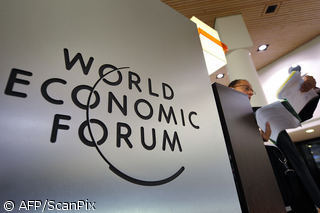Rogue trader_s reputation: a mix of bravado and humility.
Published:
7 July 1999 y., Wednesday
Rogue trader Nick Leeson walked out of a Singapore prison Saturday, four years after bringing down Britain_s oldest commercial bank and sending shock waves through Asia_s giddy financial world. Wearing a broad smile, T-shirt and warmup pants, the 32-year-old Briton was immediately taken to the airport, where security officers whisked him through passport control and put him on a commercial flight to London. Leeson spent nearly 3 years at Tanah Merah prison, convicted of fraudulently hiding $1.4 billion in losses at Barings Bank. His unauthorized futures trading made him one of the decade_s most notorious white-collar criminals. Now the subject of a book and film, Leeson has gained celebrity status. But his personality remains an enigma, his reputation an odd mix of loutish bravado and good-natured humility. Leeson, who failed math in high school, pushed his way into the financial world as a low-salaried clerk for Britain_s dignified Coutts and Co. bank in 1985. He moved to U.S. bankers Morgan Stanley in 1987, and then to Barings in London in 1989. After his trading losses were discovered, he fled Singapore but was caught in Frankfurt, Germany, and brought back to the island republic. His lawyer, Stephan Pollard, said Leeson would "certainly get a job as soon as is practicable" but cautioned that it would be difficult after spending time in prison. Newspapers reportedly have been vying to get an interview with Leeson for a six-figure sum, while the movie based on his case, "Rogue Trader," premiered last week in London before a star-studded audience.
Šaltinis:
MSNBC
Copying, publishing, announcing any information from the News.lt portal without written permission of News.lt editorial office is prohibited.
The most popular articles
 Reform of the banking system was one of the key themes at this year's World Economic Forum in Davos, with bankers coming in for a lot of criticism.
more »
Reform of the banking system was one of the key themes at this year's World Economic Forum in Davos, with bankers coming in for a lot of criticism.
more »
 Small firms have been hard hit by the economic crisis, and so must be given incentives and support, including easier access to credit, help with innovation, tax breaks and less red tape, MEPs on Parliament's Special Committee on the Financial, Economic and Social Crisis (CRIS), and experts agreed at a workshop on Monday.
more »
Small firms have been hard hit by the economic crisis, and so must be given incentives and support, including easier access to credit, help with innovation, tax breaks and less red tape, MEPs on Parliament's Special Committee on the Financial, Economic and Social Crisis (CRIS), and experts agreed at a workshop on Monday.
more »
 The elections and investiture of Porfirio Lobo as President of Honduras have cleared the way for the EU to restore normal relations with the Central American country and negotiations for signing a bi-regional Association Agreement may soon resume.
more »
The elections and investiture of Porfirio Lobo as President of Honduras have cleared the way for the EU to restore normal relations with the Central American country and negotiations for signing a bi-regional Association Agreement may soon resume.
more »
 The European Commission has approved applications from Lithuania for assistance under the European Globalisation Adjustment Fund (EGF).
more »
The European Commission has approved applications from Lithuania for assistance under the European Globalisation Adjustment Fund (EGF).
more »
 The European Commission has decided to refer Italy to the European Court of Justice (ECJ) on the basis of Article 108(2) of the Treaty on the Functioning of the European Union (TFEU) for failing to comply with a Commission decision of July 2008.
more »
The European Commission has decided to refer Italy to the European Court of Justice (ECJ) on the basis of Article 108(2) of the Treaty on the Functioning of the European Union (TFEU) for failing to comply with a Commission decision of July 2008.
more »
 The EBRD is helping to strengthen the financial sector in Bosnia-Herzegovina (BiH) with a €50 million credit line to the Deposit Insurance Agency of Bosnia and Herzegovina (DIA), the Bank’s first investment in a deposit insurance entity.
more »
The EBRD is helping to strengthen the financial sector in Bosnia-Herzegovina (BiH) with a €50 million credit line to the Deposit Insurance Agency of Bosnia and Herzegovina (DIA), the Bank’s first investment in a deposit insurance entity.
more »
 In its first investment in the natural resources sector in Bosnia and Herzegovina, the EBRD is providing a €17 million sovereign loan to finance the gasification of the Central Bosnia Canton.
more »
In its first investment in the natural resources sector in Bosnia and Herzegovina, the EBRD is providing a €17 million sovereign loan to finance the gasification of the Central Bosnia Canton.
more »
 The EBRD is increasing the availability of financing to private businesses in Armenia with a $5 million credit line and a $3 million trade finance facility to ArmSwissBank for small and medium companies (SMEs).
more »
The EBRD is increasing the availability of financing to private businesses in Armenia with a $5 million credit line and a $3 million trade finance facility to ArmSwissBank for small and medium companies (SMEs).
more »
 On January 27 the European Commission assessed the action taken by Lithuania, Malta, Latvia and Hungary in response to recommendations proposed by the Commission and endorsed by the Council in July 2009 in respect to the correction of their respective budget deficits.
more »
On January 27 the European Commission assessed the action taken by Lithuania, Malta, Latvia and Hungary in response to recommendations proposed by the Commission and endorsed by the Council in July 2009 in respect to the correction of their respective budget deficits.
more »
 EUROSTAT announced that Lithuania’s GDP rose by 6.1 % in the 3rd quarter of 2009 versus the previous quarter.
more »
EUROSTAT announced that Lithuania’s GDP rose by 6.1 % in the 3rd quarter of 2009 versus the previous quarter.
more »